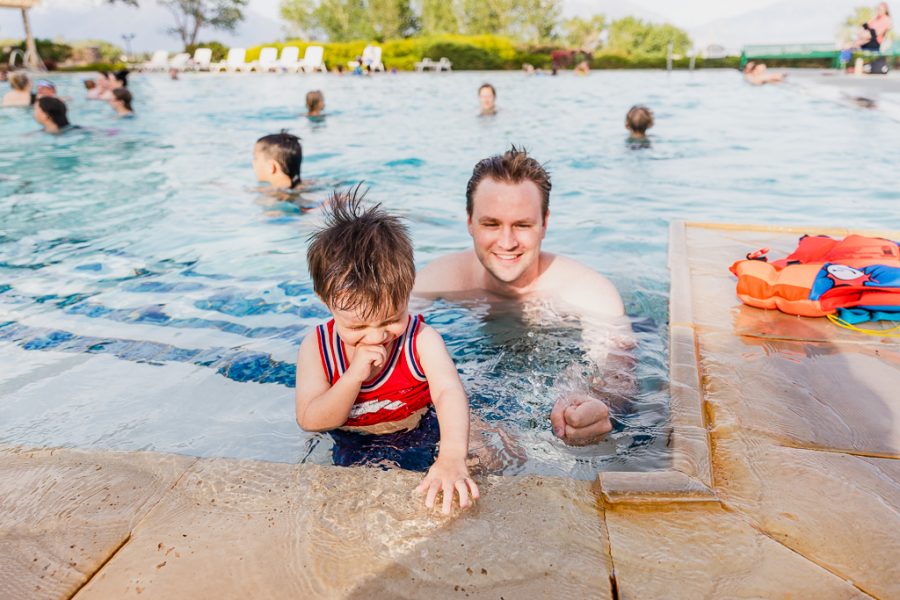Soter: How to Re-Enter the Post-Pandemic World Confidently
Ashton and Jordan Peterson enjoying the water at Hot Springs Pool in Saratoga Springs, UT on May 29, 2021. (Photo by Silvana Peterson | Daily Utah Chronicle)
June 2, 2021
In early April, I received my second dose of the COVID-19 Pfizer vaccine. By mid-April, I reached immunity, and many of my tightest coronavirus chains were finally released. After living a year in a dystopian reality, I was able to see my friends again without experiencing a full-on panic attack. However, even when mid-April came, I still felt wildly uncomfortable going back to normal. Ironically, having a social life felt more overwhelming than having no social life, and for many, this remains the case.
Last fall, I wrote an article about my unexpected social anxiety, but now I realize the pandemic wasn’t why I had less interest in human connection. Instead, the pandemic made me realize that my social life before the pandemic is not the social life I want to go back to.
COVID-19 gave us the time to contemplate what parts of our everyday lives we value, and the parts we dread. As we return to our new normal, with a deeper understanding of how fragile life can be, we can create our new lives — making them anything we want them to be.
Setting Boundaries
Human beings inherently crave a sense of belonging — we need to belong to thrive. And the pandemic perfectly illustrated this point. According to a recent study, depression rates have tripled since the start of the pandemic because of social isolation. However, before the pandemic, our urge to belong frequently became so intense that we would forget to take care of our personal needs. Inevitably, this self-neglect results in poor boundaries, and its effect is real.
The correlation between stress and poor boundaries is undeniable when considering 60% of Americans experienced significant stress daily at the beginning of the pandemic. Poor boundaries are a major cause of stress in the U.S. And because many Americans are experiencing stress about re-entering the world, the boundaries we put in place with friends and family moving forward are critical to creating a healthy post-pandemic life.
Well-enforced boundaries are rare because of emotional suppression through generations, which has led to people-pleasing tendencies. Children’s feelings were, and still are, commonly discounted as irrational by adults and authoritative figures, but in denying a child’s emotions we deny them as a being. This leads to a child with less self-trust funneling into an adult who puts others’ feelings before their own.
Children are taught that the only way to belong is to say “yes,” no matter how badly they want to say “no.” As we cope with the trauma of the last year, stress reduction is more critical. Let’s break this societal cycle by saying “yes” when we want to say “yes” and “no” when we want to say “no.” It is a simple way to start establishing boundaries and might be the best place to start.
Indulge Your Inner-Introvert
Belonging and socializing are anything but synonymous. You can belong without feeling pressure to constantly be around people. A recent study suggested that no matter what “-vert” you identify as, socializing causes fatigue, especially after months of isolation.
In the same way that you can’t go for a 5k run a week after getting a cast off, you can’t jump back into full-on extroversion after a pandemic. Instead, we must spend our time and emotional energy on our most rewarding relationships, which we’ve been forced to neglect this past year.
Listen to Yourself
Finding your boundaries and inner introvert are hard to do after spending a year in isolation. But the saying “everything in moderation,” exists for a reason: instead of jumping on every social opportunity, we need to pay attention to what we want and what will be best for us on a personal level.
Ultimately, each one of us will have unique wants and needs as we learn to greet humanity once again. So, it’s important to be aware and respectful of our own specifications and do the same for our friends and family. COVID-19 has been more traumatic than most of us can comprehend. We must be patient and kind with ourselves and others to heal and move forward in this new world.
I’m not saying that you should avoid friends and loved ones. Instead, I’m saying that you shouldn’t feel pressured to see people you don’t want to see or do things you don’t want to do. This pandemic has taken the past year of our lives. Now that we control our narratives again, let’s make them full of stories we want to tell.









